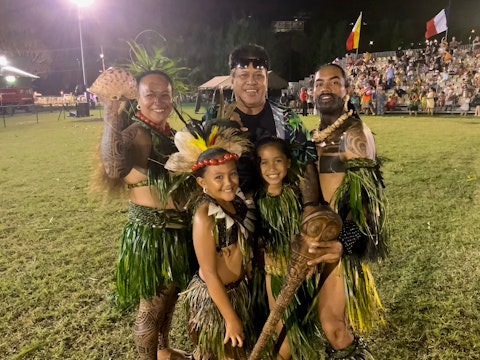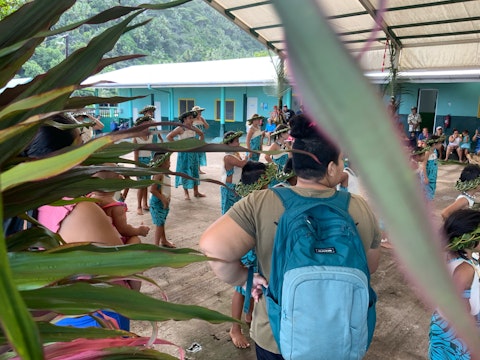The Man Who Reawakened the Haka Manu - Bird Dance
On a rainy morning in August, 2013, I made my way to the home of Edgard Kahu Tametona, a Marquesan dancer and cultural elder living in the tiny village of Hanavave, Fatu Hiva
On a rainy morning in August, 2013, I made my way to the home of Edgard Kahu Tametona, a Marquesan dancer and cultural elder living in the tiny village of Hanavave, Fatu Hiva
Kahu came to the door dressed in a colorful pareu and I introduced myself, explaining how I had come to Hanavave to learn more about Marquesan interactions with the land and the many paepae, or ancestral ruins, upon it. At first he was somewhat reticent, insisting that he was really from Omoa and had lived in Hanavave only a few years. “There are things I know, that I’ve lived with, and there are things I haven’t lived,” he said. So we decided to talk about what he knew.
Before long our discussion turned to one of Kahu’s greatest passions: dance. As a young man, he came back to Fatu Hiva from Tahiti and started to learn more about paepae through his love of dance. “When I started practicing culture, that’s when I started trying to understand” paepae, he explained. Visiting elders, he listened to different versions of legends and then worked to find the missing pieces and assemble ancestral stories he could bring to life through dance. When he grew tired he always drew energy from the forest. “I breathe, I sing, I compose my chants in nature,” he said. “And I look for drum rhythms in the natural setting where I’m composing.”
When he spoke of dancing, Kahu’s voice grew soft. His eyes flashed as he described how modern hip-hop and reggae steps are just about letting yourself go. “But to do a Marquesan dance is to live.” The dance, itself, has a spirit, and for each performance he would ask the ancestral spirits for the essence of that dance. I asked him if many young people seemed interested in keeping the old stories. “I don’t know,” he replied. “I just say, listen and try to retain it.” Because “even if you don’t remember, in just hearing and listening, one day it will come back. And even if it’s not perfect, the story will remain.” His great hope was that “one day when I leave, a wealth will be left behind.” The wealth of Marquesan culture and heritage.
Kahu was renowned for being the first man to perform the male haka manu, a traditional bird dance that died out in the 19th century. Pulling out a photo album, he explained how “the first time I danced the haka manu, everyone criticized it. I was young, then!” That was in 1989, before he became a cultural legend who performed this dance, without fail, at every Marquesan Arts Festival. The haka manu came to him through a dream in which he was flying, he said. And he didn’t practice it until the opening day of the festival that year, when he performed it for the Marquesas’ Catholic Bishop, Guy Chevalier. The steps came straight from the frigate bird, he recalled. “Because sometimes I’d go out with my brother in a boat, and I’d watch the frigate bird. And each time I saw it—he was the one who taught me. That bird taught me.”
As the patter of rain abated on the metal roof, Kahu picked up two woven rings adorned with long white and black feathers. “We call this the kièkiè,” he said. “I’ve danced with it for eight festivals. I made it, and I can’t dance without it. The bird spirit is not in me without it. And I take on the spirit of that bird.” Kahu adored performing this meaningful dance for crowds of Marquesans. But at 47, he also talked about starting to feel his age. “I’m always saying, this is my last festival,” he said with a chuckle. “But that’s because I can’t dance like I did when I was young, really flying like a bird.” Comparing himself to a tree surrounded by saplings, he mused about how “sometimes, I can see that I must die for this to grow back. The day when I’m gone, someone will want to bring it back,” and the next generation of Marquesan men will embrace the haka manu.
At last I told him I had to go, but he kept right on talking. “I like to talk,” he smiled. And thank goodness for that. Before I left he advised me to live “day by day,” without regret. “The caravan passes and the dog barks, but I don’t care!” he chuckled. “I’ll go on by.” Because “if you don’t try, how can you know if you’ll succeed?”
Kahu passed away on May 18, 2024. This piece is dedicated to him.
Watch the full video "Plongée dans les coulisses du Matavaa" by Matavaa O Te Henua Ènata here.




